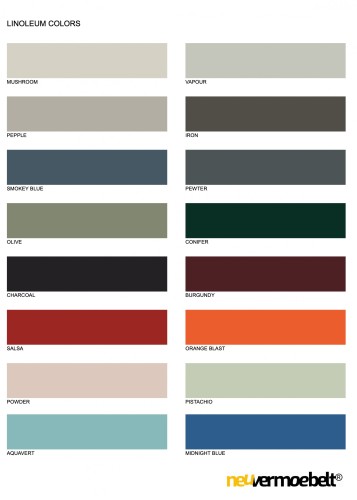Sie haben noch keine Artikel im Warenkorb.
LINOLEUM WORKTOPS
Linoleum worktops offer several advantages that make them an attractive choice for the kitchen. Here are some of the advantages of linoleum worktops:
-
Sustainability: Linoleum consists of natural and renewable materials such as linseed oil, resins, cork or wood flour and jute. It is biodegradable, low in emissions and helps reduce the ecological footprint. Linoleum is an environmentally friendly option for those looking for sustainable materials.
-
Durability: Linoleum worktops are robust and resistant to wear, scratches and stains. They can last for many years if properly maintained. Linoleum also has a natural antimicrobial property that contributes to hygiene in the kitchen.
-
Versatility: Linoleum is available in a wide range of colours, patterns and designs. It offers a wide range of design options to suit different kitchen designs. From classic solid colours to eye-catching patterns or creative combinations, there are numerous options to choose from.
-
Easy maintenance: Linoleum worktops are relatively easy to maintain. They are resistant to stains and only require regular cleaning with mild detergent and water. The surface can also be lightly polished to maintain its shine.
-
Pleasant feel: Linoleum has a soft and warm feel that is pleasant when you work with your hands. It feels pleasant when you cut food on it or roll out dough.
-
Cost saving: Compared to other worktop materials such as granite or quartz, linoleum is usually less expensive. It offers an affordable option for those who have a limited budget.
It is important to note that linoleum worktops are somewhat more sensitive to heat and moisture than some other materials. Therefore, hot pots or pans should not be placed directly on the surface and spills should be cleaned up immediately to avoid damage. Regular care and maintenance can help to maintain the durability and beauty of the linoleum worktop.
MANUFACTURING
The linoleum surface is laminated onto a multiplex/plywood board or MDF board with oak or smoked oak edge. The thickness of the worktop can be chosen from 20-30mm.
The edges of the linoleum worktops consist of the typical Ildefonso edge of the multiplex board or solid natural or smoked oak edge as glue-in. All edges are treated with a natural oil and have a radius of 1.0mm.
About the material
Among the most important advantages of linoleum is that it is a natural material that can withstand stains and superficial scratches and is easy to clean, acquiring a beautiful patina over time, similar to that of a wooden worktop.
Good to know
Natural materials have the property of repairing themselves, so minor scratches in the surface disappear by themselves. The material is antistatic, dust-repellent and antibacterial. Linoleum permanently retains its matt appearance and does not lose its colour in the long term.
However, the organic properties of the material make it susceptible to permanent damage when exposed to temperatures higher than 70 °C. Contact of a linoleum worktop with acidic and sharp objects can also cause damage and stains. It is important to wipe down your linoleum worktop if you spill anything.
However, LINOLEUM also has one weakness. You should be careful with hot pots and pans and always use a trivet, otherwise the glue between the backing board and the laminate could come loose.
Care and maintenance
Linoleum should be cleaned with a pH-neutral cleaning agent and preferably a linoleum cleaner. It is advisable to occasionally apply a linoleum care product to the worktop. This makes the surface more resistant to wear.

